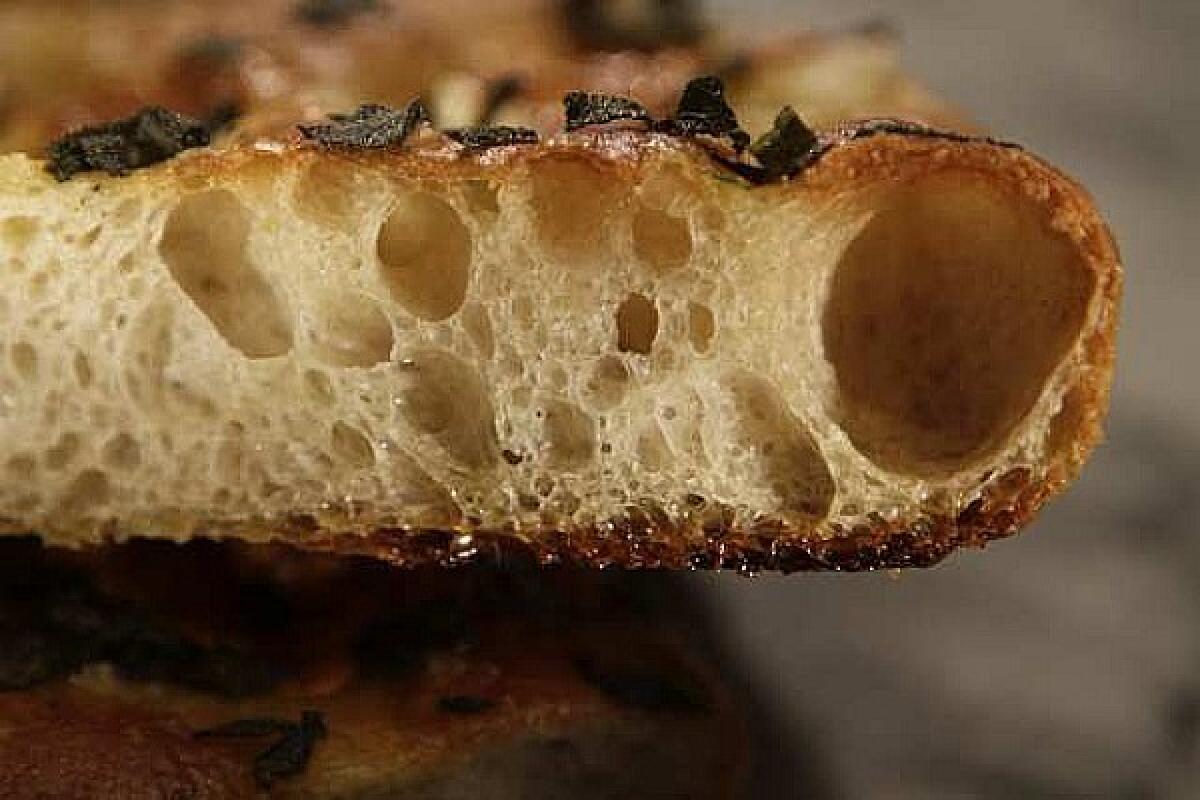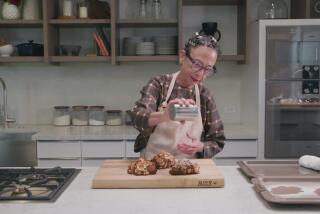Recipe: Nancy Silverton’s basic focaccia

Nancy’s basic focaccia dough
Total time: 3½ hours, plus 12 to 24 hours resting time for the sponge
Servings: Makes 2 (10-inch) focaccia dough rounds
Note: This recipe requires the use of a stand mixer, 2 (10- by 2-inch) round cake pans and a digital kitchen scale. Cake yeast is available at cooking and baking supply stores, as well as at select gourmet markets. The sponge must be started a day in advance.
Focaccia sponge
Scant 1/8 packed teaspoon cake yeast or 1/16 teaspoon active dry yeast
Scant ½ cup (3.71 ounces) water
1/2 cup plus 3 tablespoons (3.04 ounces) bread flour
1. In a small mixing bowl (preferably plastic or ceramic), sprinkle the yeast over the water. Set the bowl aside for a few minutes to give the water time to absorb the yeast. Using a wooden spoon, stir in the bread flour until all of the ingredients are thoroughly combined.
2. Cover the bowl tightly with a sheet of plastic wrap, then tightly wrap another piece of plastic wrap or twine around the perimeter of the bowl to further seal the bowl.
3. Set the bowl aside at room temperature (ideally 68 to 70 degrees) until the sponge becomes bubbly and thick, like the consistency of wallpaper paste (thicker than a pancake batter but thinner than dough), 12 to 24 hours.
Focaccia dough
1 1/4 cups plus 2 tablespoons (11.04 ounces) water
1/2 cup plus scant 1 tablespoon (.39 ounce) olive oil, divided
Focaccia sponge
2 packed tablespoons plus ¼ packed teaspoon (.39 ounce) fresh cake yeast or 1¾ teaspoons (.195 ounce) active dry yeast
2 tablespoons plus ¾ teaspoon (.56 ounce) rye flour
3 1/3 to 3 2/3 cups (15 to 16.45 ounces) bread flour, more if needed
1 tablespoon (.39 ounce) kosher salt
1. About 3½ hours before you are ready to bake the focaccia, place the water, scant tablespoon olive oil and sponge in the bowl of a stand mixer. Fit the mixer with a dough hook and, over low speed, add the yeast, rye flour and 15 ounces (3 1/3 cups) bread flour. Mix the ingredients over low speed for 2 minutes to thoroughly combine and form the dough.
2. With the mixer running, slowly add the salt, then increase the speed to medium. Continue mixing the dough until it is smooth and well-formed, and starts to pull away from the bowl, 6 to 8 minutes. Note that the dough will not pull so much that it “cleans” the bowl, but if the dough is too sticky and is not pulling away from the sides of the bowl at all, add a little more bread flour (a spoonful as needed at a time) to achieve the right consistency.
3. While the dough is mixing, lightly grease a bowl large enough to hold the dough when it doubles in size with olive oil. When the dough is ready, turn it out of the mixer into the oiled bowl. Wrap the dough tightly in plastic wrap and tightly wrap the perimeter of the bowl with kitchen twine or another piece of plastic wrap to further seal the bowl. Set the dough aside at room temperature (ideally 68 to 70 degrees) until doubled, about 1½ hours.
4. Dust the work surface lightly with flour and turn the dough out onto the floured surface. Acting as if the round has four sides, fold the edges of the dough toward the center. Turn the dough over and return it, folded side down, to the bowl. Cover the bowl again with plastic wrap and set it aside at room temperature until it has doubled in volume, 50 minutes to 1 hour. (The dough will be puffy and will feel alive, springy and resistant. It will not collapse under the touch of your fingertips.)
5. Pour ¼ cup olive oil into each of the cake pans, and tilt the pans so the oil coats the bottom evenly. Dust the work surface again lightly with flour and carefully turn the dough out onto the floured surface, taking care not to deflate the dough in the process. Divide the dough into two equal segments, each weighing approximately 18 ounces. Place the dough segments in the prepared cake pans and very gently pull the edges just to obtain a roughly round shape. Cover the pans with a clean dishcloth and set aside at room temperature until relaxed and spread to cover about half of the surface of the pans, about 30 minutes.
More to Read
Eat your way across L.A.
Get our weekly Tasting Notes newsletter for reviews, news and more.
You may occasionally receive promotional content from the Los Angeles Times.










